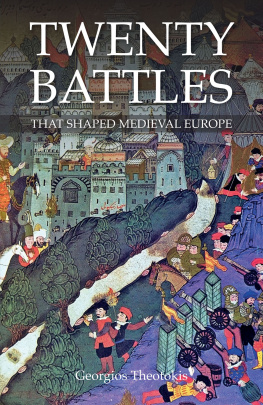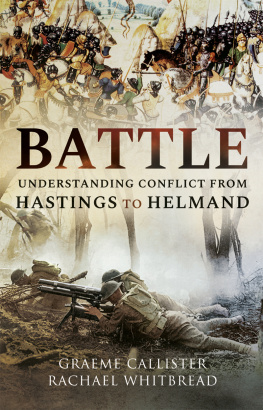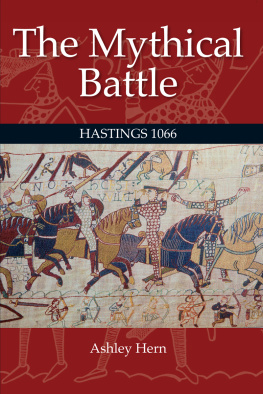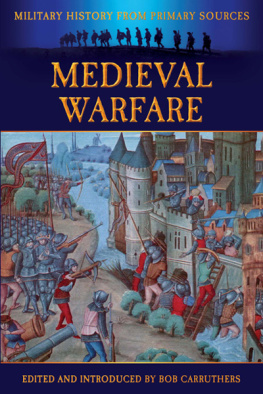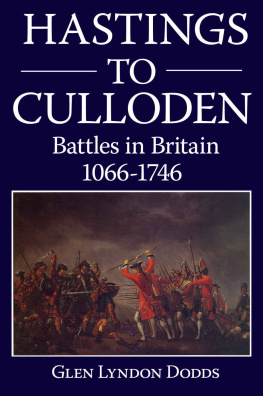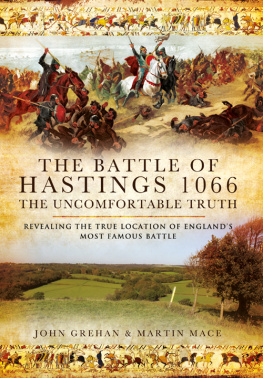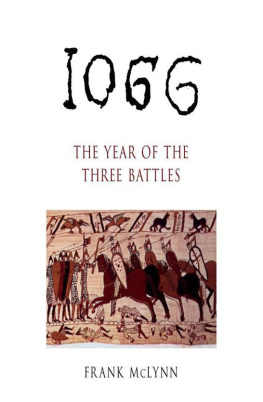Contents
Guide
TWENTY BATTLES
THAT SHAPED MEDIEVAL EUROPE
DEDICATION
To the handful of people who believed in me.
With all my heart.
TWENTY BATTLES
THAT SHAPED MEDIEVAL EUROPE
Georgios Theotokis

First published in 2019 by
Robert Hale, an imprint of
The Crowood Press Ltd,
Ramsbury, Marlborough
Wiltshire SN8 2HR
www.crowood.com
This e-book first published in 2019
Georgios Theotokis 2019
All rights reserved. This e-book is copyright material and must not be copied, reproduced, transferred, distributed, leased, licensed or publicly performed or used in any way except as specifically permitted in writing by the publishers, as allowed under the terms and conditions under which it was purchased or as strictly permitted by applicable copyright law. Any unauthorised distribution or use of this text may be a direct infringement of the authors and publishers rights, and those responsible may be liable in law accordingly.
British Library Cataloguing-in-Publication Data
A catalogue record for this book is available from the British Library.
ISBN 978 0 7198 2873 7
Ebook ISBN 978 0 7198 2874 4
The right of Georgios Theotokis to be identified as author of this work has been asserted by him in accordance with the Copyright, Designs and Patents Act 1988.
CONTENTS
Almohads Islamic Berber tribesmen from North Africa who invaded the Iberian Peninsula in 1145 and maintained a caliphate there until the 1230s.
Almoravids Islamic Berber tribesmen from North Africa who invaded the Iberian Peninsula in 1085, in response to the Christian conquest of Toledo, and maintained a state there until the 1140s.
Angevin Meaning from Anjou, applied to the first English kings of the Plantagenet dynasty ie Henry II (115489), Richard I (118999), John (11991216).
battle A division of an army. Typically in the later Middle Ages there were three. On the march they formed van, main body and rear-guard.
burgh Old Germanic word for a walled, fortified site, generally of earth and timber.
Caballeros villanos Commoner knights, frontier warriors in Reconquista, Spain.
carroccio An ox-drawn wagon carrying the banner of an Italian city-state.
castellan A man entrusted with the command of a castle.
Catharism A Christian dualist heresy, whose followers believed that the world was created by the Devil. Popular in south-western France around 1200.
chevauche French term for a mounted raid intended to destroy an enemys resources, damage.
condottieri Mercenaries employed by fourteenth- and fifteenth-century Italian city-states.
dediticii Barbarians who surrendered themselves to the Empire and were received into the state for settlement.
Fatimids Caliphs and rulers of Egypt from 969 until overthrown by Saladin in 1171. They were of the minority Shia form of Islam.
field army Mobile forces, as opposed to those in garrisons in castles and towns.
foederati Barbarians in a treaty (foedus) relationship with the Empire.
Greek fire An inflammable mixture made from a now lost recipe originally known by the Byzantines and later used in the Islamic world and the West.
halberdiers Soldiers carrying pole-arms with blade- or axe-shaped heads, swung in close combat.
Hospitallers The hospital of St John, a charitable foundation, assumed military functions in the mid-twelfth century. Most brothers were Western knights, mainly French, who led a monastic life. They acquired land in the West, and played an important role in defending the crusader states.
housecarl Member of a Scandinavian lords military household; they are found in England after Cnuts conquest (1016) until 1066.
iqta A grant of land or revenues by an Islamic ruler to an individual.
Janissaries The yeni askeri (new troops in Turkish), raised by the Ottomans in the mid-fourteenth century to provide their largely cavalry forces with reliable infantry.
jihad Islamic holy war, the duty of Muslims to wage war on non-Muslims until they submit.
laager An encampment made by drawing an armys baggage wagons into a circle/square.
laeti Barbarians captured by the Romans and settled on the land.
limes (Lat.) Literally, border or wall.
men-at-arms Heavily armoured soldiers trained to fight as cavalry, by the fourteenth century in addition to knights; these included lesser nobles, such as esquires and gentlemen.
palisade A wall/stockade made from stout timber.
pavisse A tall shield, usually rectangular, used from the twelfth to the fifteenth centuries to give a man complete protection, especially at sieges.
routiers French term for bands of mercenary soldiers in twelfth- to fourteenth-century Europe
schiltron Circular formations of infantry armed with long spears, employed in Scotland at the end of the thirteenth century.
Templars The knights of the Order of the Templar, founded in 1128 for the protection of pilgrims on the route to the River Jordan.
Teutonic Knights A monastic military order founded in the Holy Land c. 1190, invited to Poland where by 1250 it had established an independent Order state in Prussia.
WAR AND MILITARY HISTORY
T HIS BOOK IS a history of Europe in the Middle Ages viewed through the lens of the most potent and dramatic aspect of war: battle. It is not designed to give a detailed account of the political or social history of Europe between the fourth and the fifteenth centuries, a period that we have come to identify as the Middle Ages, but rather, to work as a general introduction into the basic principles of war, strategy, military equipment and battle tactics of European armies in the aforementioned period. Its central aim is to stimulate the readers interest in the importance of pitched battles in war, and to explain the geopolitical gravity of twenty of them in the shaping of the European Continent as we came to know it in the early modern times that followed.
Warfare has been one of humankinds predominant activities since the dawn of civilization, affecting every aspect of life for millennia. But what, exactly, is war? If you put this question to an enthusiast or a junior scholar of history, you are more likely to receive quotations or probably paraphrases ranging from Clausewitz (War is thus an act of force to compel our enemy to do our will), perhaps the most influential military theoretician of the gunpowder era, to the oldest surviving military treatise in the world written by Sun-Tzu (fifth century BC ). War, however, is a violent form of interaction that has dominated human life for millennia. Therefore, to understand mans insanity of going to war against his own species, other sciences such as psychology, sociology, evolutionary biology and anthropology can add to the theories raised in the past.
In order to explain mans pathological behaviour, evolutionary biologists have put the blame on several factors, ranging from a selfish gene most eager to replicate, to excessive amounts of testosterone directly linked to aggressiveness. Psychological explanations put forward by William James as early as 1910 have suggested that warfare was prevalent because of its positive psychological effects, both on the individual and on society as a whole.
Next page
